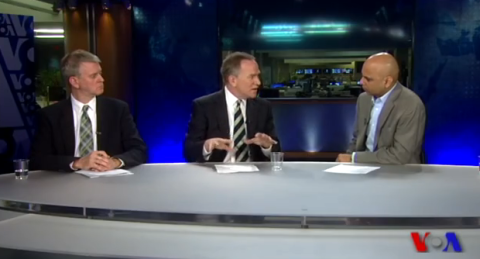
ICFJ's Patrick Butler (middle) participates in a VOA Urdu panel discussion on digital journalism. Source: screen-grab from VOA Urdu video.
ICFJ’s Vice President of Programs, Patrick Butler, recently participated in Voice of America Urdu’s first Student Town Hall panel discussion, where he emphasized the importance of new and emerging journalism technologies but also stressed the value of traditional reporting practices.
The Town Hall discussion, “Digital Journalism: Challenges and Opportunities,” took place on Nov. 19 and featured several other media leaders from both the U.S. and Pakistan along with students from the Institute of Business Management (IOBM) in Karachi.
The panelists and students discussed rapidly changing media trends as well as the importance of maintaining traditional journalism practices to ensure accuracy and fairness in reporting. Butler warned the students that reporters should never hide behind technology.
“We should never give up what we call ‘shoe-leather journalism,’ which is being out on the street, meeting people, finding the story and talking to people face to face,” he said. “It is tempting with digital media, with email, with direct messages on Twitter, to do all our interviews on the computer instead of being out and we never leave the newsroom. And that’s a real danger.”
Butler also said we need to promote "media literacy, which is educating students...and the general public at large about how [to] evaluate all these myriad sources of information coming at us now, which are much more than we ever had before...that would be a good idea for Pakistani universities to adapt."
See the whole VOA Urdu panel discussion here.